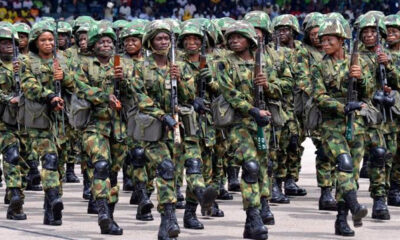Business
Doubts as Nigeria negotiates debt relief with World Bank, IMF

• Owoh: It’s fruitless, costly effort to further defraud citizens • Economy risks junk status, experts warn
• Country faces hard, painful choices, says Oxford economist, Dercon
• El-Rufai admits NNPC hasn’t brought N20,000 to nation’s treasury in 2022, says it’s a failure
During a media interview on the sidelines of the ongoing World Bank and International Monetary Fund (IMF) Annual Meeting on Wednesday, Ahmed said FG had commenced discussions with the Bretton Wood institutions on debt restructuring for the country.
“It is a fact that Nigeria’s debt has increased over the last three to four years and this increase in debt was occasioned by the different kinds of exogenous shocks that the country faced, which are not unique to Nigeria. The situation we have by the 2023 projection is that we will need about 65 per cent of our revenues to service debt.
“Unfortunately, the cost of debt service is rising, because of the growing interest rate globally, which is resulting also in higher debt service costs. But our projection from the debt sustainability analysis is that Nigeria is able to cope with its debt service in 2022 as well as in 2023.
“We have been engaging financial institutions to look at the opportunity to restructure our debt to further stretch the debt service period to give us more fiscal relief. Those are some of the things we want to achieve in this meeting,” Ahmed said.
READ ALSO:
- Ogun man kills wife, burns corpse with iron
- How I was framed for armed robbery, dumped in prison — 32-yr-old painter
- 2023: It’s reward time for Tinubu, say Kwara governor, senator
The official disclosure came same day Managing Director of Augusto & Co, Olabode Augusto, raised the alarm that Nigeria was on “its road to Zimbabwe,” stressing that no other country is leveraging 10x spending as the country is currently doing. Leverage ratio is the level of debt in proportion to income or equity.
According to Augusto, crisis-ridden Sri Lanka and neighbouring Ghana, which is seeking debt restructuring, have a leverage ratio of 7x and 3x respectively.
While Ahmed is in Washington negotiating with development partners, one of the world’s most renowned economist and Director of the Centre for the Study of African Economies, University of Oxford, Prof. Stefan Dercon, is in Nigeria to speak on the state of the economy and the options before the managers.
On Wednesday, Dercon dismissed Nigeria as a country trapped in an ‘elite bargain’ crisis. He said hard choices would be able to rescue the economy but warned that even choices are limited in these hard times. He said any decision taken to achieve macroeconomic stability would be painful. The best time to act was about seven years ago, he said, advising the country to continue to manage the situation but show commitment to making hard decisions when things are more stable.
Reacting to the Minister’s disclosure, a professor of economics and debt management expert, Godwin Owoh, described the plan as another fruitless and costly ploy that would further drain public purse. He challenged government to provide more information about the consultants it is working with to help Nigeria evaluate the process.
“Who are the consultants they are working with? What are their terms of reference?” Owoh asked, saying there is little room for negotiating restructuring of the country’s debt. He said some of the debts are still shrouded in secrecy, adding that debt restructuring negotiation can take up to a year, which the current administration does not have the luxury of time to see the process through.
Chief Executive Officer of Dairy Hills Limited, Kelvin Emmanuel, warned that the move would downgrade the country’s economy to ‘junk status’, which would mean that the country will no longer be creditworthy in the international market.
Emmanuel also argued that converting the ways and means (W&M) facility into local debt stock is not only a violation of the Central Bank of Nigeria (CBN) Act, but would also increase the total debt stock by over 50 per cent and worsen the cost of servicing; as well as trigger a downgrade to a lower rating from the current not-too-good B2.
READ ALSO:
- Buhari Approves 12,000 Metric Tons Of Grains For Flood Victims
- Why we quashed terrorism charge against Nnamdi Kanu — Appeal Court
- Governor Sanwo-olu signs MoU with Del-York to build media, film city in Lagos
“Seeking to raise $20 billion is proof that the government does not understand the impending doom the economy faces in the current trajectory,” he said.
President Muhammadu Buhari had at the United Nations General Assembly in September sought the assistance of world leaders in considering granting debt relief or outright cancellation to developing countries.
But the Deputy Managing Director of IMF, Kenji Okamura, has urged governments to be prudent and spend public resources for the greater need of the people.
He said: “We live in turbulent times, which highlights the importance of social contracts – an understanding of mutual expectations that bind citizens and their governments. To strengthen public trust and support social cohesion, governments need to invest in basic public services and deliver more inclusive policies. Fair and more transparent use of public resources is key.”
At a press conference, yesterday, the Managing Director of the Fund, Kristalina Georgieva, appealed to policymakers to act with a sense of urgency to bring down inflation and support vulnerable emerging markets.
The statement came shortly after the reading of the United States’ September Consumer Price Index (CPI), which showed a slight decline, but higher-than-expected inflation. The inflation rate slowed to 8.2 per cent from 8.3 per cent in August.
Georgieva said policymakers need to act now and act together in resolving inflation and safeguarding financial stability. On this note, she said, macro-prudential policies need to be vigilant and proactively address pockets of vulnerability.
“In this environment, we also must support vulnerable emerging markets and developing countries. It is tough for everybody, but it is even tougher for countries that are now being hit by a stronger dollar, high borrowing costs, and capital outflows, a triple blow that is particularly heavy for countries that are under a high level of debt.”
MEANWHILE, Kaduna State governor, Nasir Ahmed el-Rufai, has restated that the Nigerian National Petroleum Company Limited (NNPCL) is a big problem to Nigeria, and unless it is completely sold, it is capable of bringing the country to its knees.
In the build up to elections of 2015, el-Rufai and the All Progressives Congress (APC) promised to reorganize the corporation but a few months to the departure of this administration, the lamentation has not changed.
READ ALSO:
- UNILAG tops Nigerian varsities, makes 401-500th global ranking
- Court acquits ex-Jigawa Governor Turaki of N8.3b fraud
- BREAKING: ASUU Finally Suspends Strike
The governor, who stated this while speaking on Channels Television special programme to mark the beginning of the yearly Kaduna Investment Summit (KADInvest 7.0), said the Federal Government has failed in the oil and gas business and should get out of the sector.
El-Rufai, while speaking to the theme of the summit, ‘Building a Resilient Economy,’ stated that since the beginning of this year, NNPCL has not brought even N20,000 to the Federation Account.
According to him, “NNPC is a big problem to Nigeria and unless we resolve it, it will bring Nigeria to its knees. It is a systemic and institutional problem, it is beyond one person.”
He said: “There is no reason why government should still be in the oil and gas sector. It should just get out, it has failed. By every measure it has failed.
“When I say the Federal Government should get out of oil and gas, people shouldn’t think it’s crazy, it’s not. We are living on taxes. It is PPT, royalties and income tax that is keeping this country going, because NNPCL claims that subsidy has taken all the oil revenues. I don’t believe that. So, the government should sell everything — the oil and gas sector. I have been making this point since 1999 when I was head of the Bureau of Public Enterprises (BPE). I have not changed my mind.
“The government should get out of whatever is left of electricity. Leave it to the private sector. Maintain the environment. The money will come. Nothing has changed for NNPC other than adding L to it for the limited. They are still taking our money. They are still declaring profits that we don’t see the dividends.”
Speaking further, el-Rufa’i said the sectors doing well in the country like entertainment, telecoms, fintech and others have no government involvement.
Guardian
Business
Dangote Refinery: MRS, other filling stations increase petrol price
Dangote Refinery: MRS, other filling stations increase petrol price
The price of petrol has surged to N930 per litre in Lagos and N960 in northern states, following the recent suspension of naira payments for crude oil by the Dangote refinery.
MRS filling stations implemented the new pricing structure on March 28, 2025, marking a N70 increase from the previous rate of N860 in Lagos and N80 higher than the former N880 in the North.
Other fuel retailers have also adjusted their prices, with NIPCO reportedly selling at N930 per litre in Magboro, Ogun State, on Saturday.
According to MRS Oil & Gas, trucks will load products from its Lagos depot and distribute them across the country at varying costs.
The company’s latest pricing document confirms that Lagos has the lowest fuel rate, while northern states face the highest prices. However, the company did not specify whether it sourced its supply from the Dangote refinery.
Under the revised price framework, petrol now costs N930 per litre in Lagos, N940 in other South-West states, and N960 in the South-South and South-East regions, including Edo, Abia, Akwa Ibom, Bayelsa, Rivers, Cross River, and Enugu.
READ ALSO:
- Ex-Rivers HoS wife cries for help over husband’s safety
- Fubara reacts as Ex-HOS, Nwaeke accuses him of bombing oil pipelines, Rivers Assembly
- Natasha: Emmanuel Uduaghan threatens to sue Senator Nwaebonyi
In the North, Abuja, Kaduna, Benue, Kogi, Niger, Sokoto, Kebbi, and Nasarawa will pay N950 per litre, while Zamfara, Kano, Jos, Bauchi, Taraba, Adamawa, Borno, Katsina, Jigawa, Gombe, and Yobe will pay N960.
The Free Carrier Agreement (FCA) price, which determines how much marketers pay before reselling fuel, also differs by region. Lagos has the lowest FCA price at N905 per litre, whereas states like Borno, Taraba, Adamawa, and Yobe have FCA prices around N888 per litre.
The recent suspension of the naira-for-crude initiative by the Dangote refinery was attributed to discrepancies in crude oil allocation. Sources indicate that the Nigerian National Petroleum Company Limited (NNPCL) allocated large volumes of crude to foreign creditors to settle outstanding loans, making it difficult to sustain local transactions in naira.
As a result, independent fuel importers have taken advantage of the situation, increasing depot prices. Industry analysts warn that the rising petrol costs could drive up transportation fares and the prices of goods and services.
Experts suggest that prices may stabilize once the Dangote refinery secures a reliable crude oil supply from NNPCL and resumes selling in naira. Until then, consumers across the country will have to contend with higher fuel costs.
Dangote Refinery: MRS, other filling stations increase petrol price
(PUNCH)
Auto
Lanre Shittu Motors to endow Automobile Department of Lagos Technical College
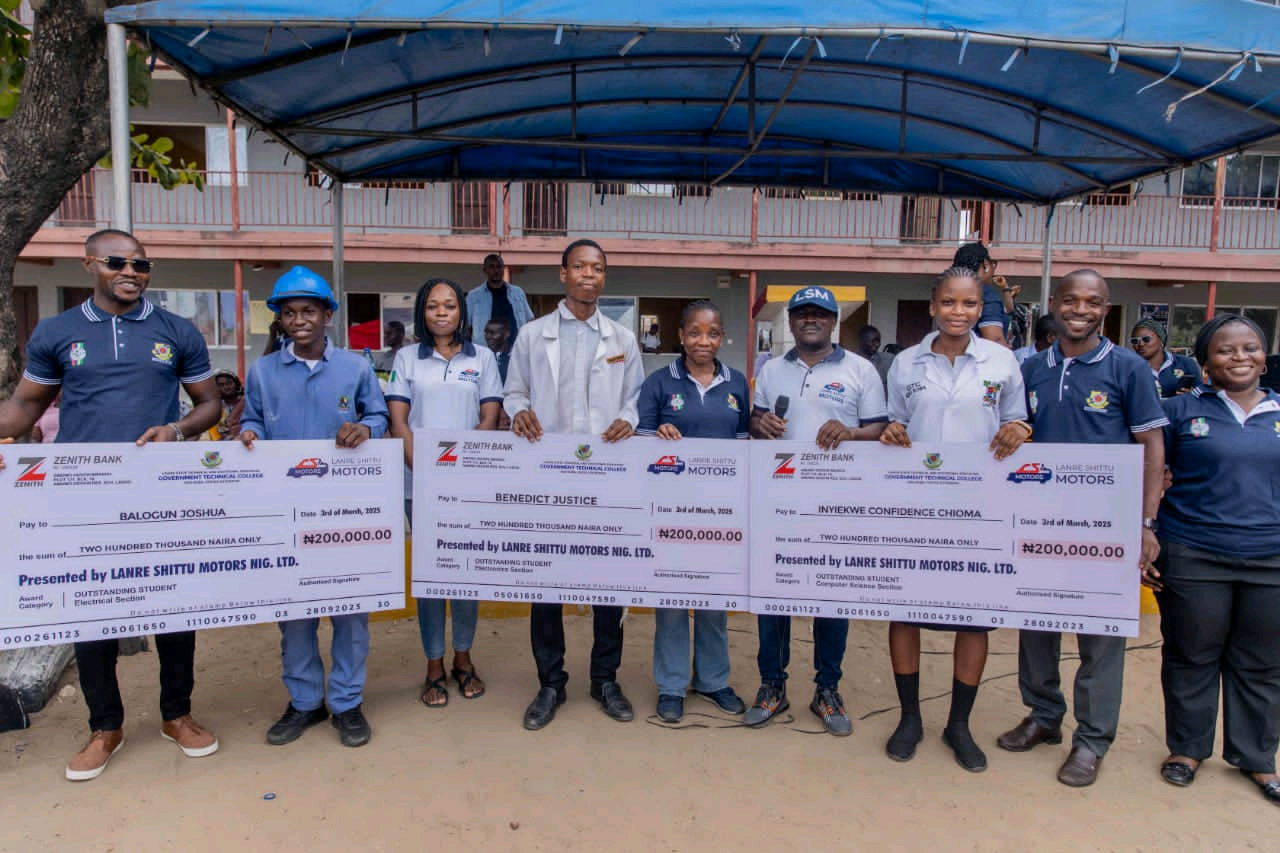
Lanre Shittu Motors to endow Automobile Department of Lagos Technical College
Lanre Shittu Motors has announced a novel idea that will boost automobile studies in a Lagos technical college.
Specifically, it has pledged to adopt the Automobiles Department of the Government Technical College, Aso-Soba in the Festac area of Lagos.
This is intended to raise academic and practical programme standards of the school.
The company said this would involve adequate funding, in-school training and intensive industrial training (IT) with welfare package to encourage more young people to pursue academic career in automotive engineering.
Business Support/Admin Manager of LSM, Mr Babatunde Adenuga, disclosed this in Lagos, in an interview with journalists.
Adenuga represented the LSM Managing Director, Mr Taiwo Shittu, at the just concluded Engineering Week of the college sponsored by the auto company, where he unveiled the plan to the staff and students at the event’s grand finale.
Aside from the needed financial support to make the auto department functional and standard, he said LSM would provide the tools, overall wears/workshop uniform, among others, as part of the welfare package for the students.
He said it would be a win-win situation for the school and the company.
Adenuga said, “The school will benefit immensely from the LSM package for the department as we take the financial trouble of running the department away from them.
“Students from the department can come for their internship at LSM workshops, and getting jobs after school won’t be difficult.
“For us, it will be a seamless arrangement in getting suitable personnel familiar with our training and business orientation.”
He also said the LSM had been absorbing students from the school and others for their industrial training (IT), providing them with useful hands-on training and monthly stipend to keep them going.
The LSM MD, Taiwo Shittu, commenting on the support, said, “We’ll be part of the progress of the school. We want to own a department in the technical college, the automobile department of studies that will enable us to fund the place; take care of the welfare of students, providing the tools, overall uniform and other facilities.”
“At LSM, we see training the youths as part of our Corporate Social Responsibility. Every year, we take in youths into our facility and train them; even while in training, we give them stipends.”
The highpoint of the LSM-sponsored Government Technical College event was the presentation of prizes to outstanding students in the various competitions held for the Engineering Week.
Three of the students whose projects stood out such as locally produced water pumping machine and water heater went home with impressive cash awards.
Principal of the college, Mr Folarin Sunkanmi, expressed appreciation to LSM for the interest in the school, starting with giving the students the opportunity for industrial training and offering them monthly stipend.
The principal commended the LSM efforts of sponsoring the engineering week’s activities, whose theme was given as ‘Engineering for Sustainable Development (Innovators of tomorrow)’
He urged other companies to emulate the LSM example in order to boost the employability chances of products of the technical colleges and engineering departments of higher institutions in the country.
Business
Elon Musk sells X to AI startup for $33 billion

Elon Musk sells X to AI startup for $33 billion
Billionaire entrepreneur Elon Musk has announced the merger of his artificial intelligence startup, xAI, with his social media platform, X, in an all-stock transaction valued at $45 billion.
This move brings xAI’s valuation to $80 billion, while X is valued at $33 billion.
Both xAI and X are privately held entities under Musk’s control.
The two companies share notable investors, including Andreessen Horowitz, Sequoia Capital, Fidelity Management, Vy Capital, and Saudi Arabia’s Kingdom Holding Co.
Musk, in a post on X, stated that the merger would combine their data, computing power, distribution, and talent to create more advanced AI-driven experiences while staying committed to their core mission of truth and knowledge advancement.
“@xAI has acquired @X in an all-stock transaction. The combination values xAI at $80 billion and X at $33 billion ($45B less $12B debt).
Since its founding two years ago, xAI has rapidly become one of the leading AI labs in the world, building models and data centers at unprecedented speed and scale.
READ ALSO:
- Barbaric mass burning of innocents in Edo, by Farooq Kperogi
- Investigation of wanted businesswoman Achimugu not linked with Atiku, Sanwo-Olu – EFCC
- No Sallah durbar festival in Kano this year – Police warn
X is the digital town square where more than 600M active users go to find the real-time source of ground truth and, in the last two years, has been transformed into one of the most efficient companies in the world, positioning it to deliver scalable future growth.
xAI and X’s futures are intertwined. Today, we officially take the step to combine the data, models, compute, distribution and talent. This combination will unlock immense potential by blending xAI’s advanced AI capability and expertise with X’s massive reach. The combined company will deliver smarter, more meaningful experiences to billions of people while staying true to our core mission of seeking truth and advancing knowledge. This will allow us to build a platform that doesn’t just reflect the world but actively accelerates human progress.
I would like to recognize the hardcore dedication of everyone at xAI and X that has brought us to this point. This is just the beginning,” he stated.
xAI’s growing footprint in AI
Founded less than two years ago, xAI aims to “understand the true nature of the universe.” The company has been developing large language models and AI tools, positioning itself as a direct competitor to OpenAI, a company Musk co-founded in 2015 before exiting due to strategic differences.
In June 2024, xAI announced plans to build a supercomputer in Memphis, Tennessee, to train its AI chatbot, Grok. By September, Musk revealed that part of the Memphis-based supercomputer, called Colossus, was already online.
xAI’s rapid expansion has drawn scrutiny from environmental and public health advocates, who cite a lack of community input in its Memphis project. The Colossus supercomputer is powered by natural gas-burning turbines, and xAI plans to expand operations with a nearby graywater facility.
Elon Musk sells X to AI startup for $33 billion
-

 Uncategorized24 hours ago
Uncategorized24 hours agoBreaking: Moon sighted in Saudi, UAE, others, Eid-Fitr holds Sunday
-
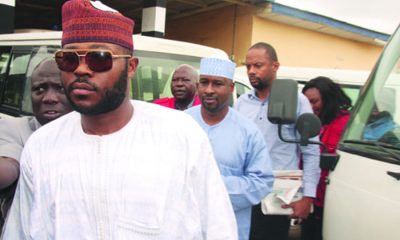
 metro2 days ago
metro2 days agoEFCC re-arraigns son of ex-PDP chairman for alleged N2.2bn oil subsidy fraud
-

 metro19 hours ago
metro19 hours agoRamadan ends in Nigeria, Sultan announces March 30 as Eid-el-Fitr
-
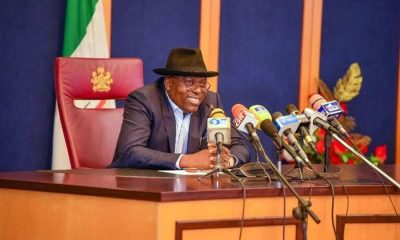
 metro1 day ago
metro1 day agoFubara reacts as Ex-HOS, Nwaeke accuses him of bombing oil pipelines, Rivers Assembly
-
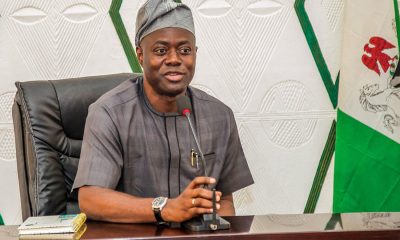
 metro2 days ago
metro2 days agoWe welcome Gov Makinde’s U-turn on Shari’ah panel – MURIC
-

 Opinion1 day ago
Opinion1 day agoBarbaric mass burning of innocents in Edo, by Farooq Kperogi
-

 Uncategorized2 days ago
Uncategorized2 days agoObasanjo’s position on Rivers emergency rule hypocritical, says Presidency
-
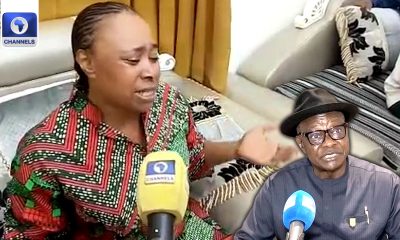
 metro1 day ago
metro1 day agoEx-Rivers HoS wife cries for help over husband’s safety









